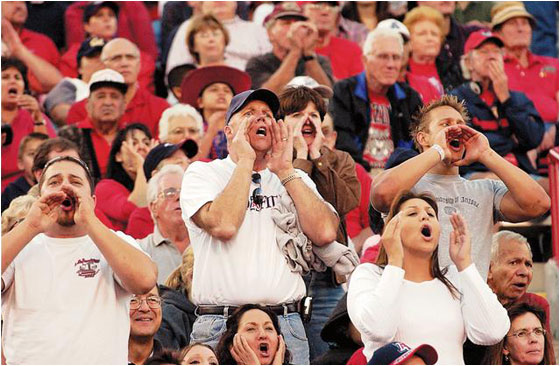It's never too early to be a great dad.
Project number one is on heckling: Does booing result in players or teams playing worse?

The conventional wisdom seems to be that booing is a bad thing -- bad for individual performance, bad for teams, and bad for society. Sports commentators regularly complain about how destructive it is for fans to boo their home teams and the Washington Interscholastic Activities Association actually went as far as trying to ban booing at high school games in the state last year. But where is the science to back it up? Might booing actually make certain players better? Might it improve team dynamics? Might booing be brought into the classroom or workplace to ameliorate lagging American competitiveness in the global economy?
Here are l'il Billy's hypotheses:
1. Booing by home fans tends to make players perform worse than they would otherwise.
* Donovan McNabb's mother has asked that he not be included in the sample.
** It is possible that booing by home fans may, however, have a positive effect on teams by forcing management to fire poor coaches, trade dud players, or spend more money on bringing in stars.
2. Booing by opposing fans tends to make poor players perform even worse.
* If you suck, you know it and it just hurts when people point it out.
3. Booing by opposing fans tends to make superstar players perform even better.
* Some players seem to actually feed off the hate (ala the slime in Ghostbusters). Manchester United's Ronaldo's pouty perfection often seems at its apex when the stands are bellowing their disgust.
Needless to say, a National Science Foundation grant is probably in order: it takes some serious cash to get Tim Thomas, Derek Jeter, and a Bunsen burner in the same room.
4 comments:
L'il Billy: Your categories (2) and (3) are largely tautological. D minus. Stop listening to your father.
Anonymous:
First of all your mother is tautological.
Second of all, what are you talking about? Looking at just the second hypothesis: It's possible that booing by opposing fans might make poor players perform better. After all, a poor player may have more of a chip on his shoulder; booing may remind him of the fact that there are no hand outs in life and he has to fight for success, thus, resulting in him trying even harder. Alternatively, a poorer player who is booed may still be popular with his teammates who feel bad about the booing and, as a result, do their best to help that player out (for example, by being more conscious about supplying accurate passes to him or delivering better blocks). Alternatively, booing by opposing fans might not matter at all for poor players. They may have heard booing so often that it is background noise that they hardly notice at all.
Smell ya lata,
L'il Billy
Billy: The point is that you can't identify players as "good" or "bad" without reference to their performance on the road, which, to the extent that it is influenced by booing, contributes to their being "good" or "bad," which in turn leads you to identify them as "good" or "bad," and so on. Also, I really feel like the fact that my mother defines herself by reference to herself is mostly irrelevant to this conversation.
Anonymous:
It may be that I'm only 11 years old, but I don't understand the point you are trying to make. Step one of the science project is to define what makes a player "poor": to make it simple, in baseball, we might say any non-pitcher who hits under .245. Step two is to take a player who hits under .245 and look at all the games that player played when he was getting booed and see if he hit above or below his overall average. If a player gets booed every single time he goes up to bat, the numbers won't tell you all that much but that will hardly ever (if ever) be the case and certainly will not matter as we look at the broad effects on all players. Yes, I have over-simplified matters, but there is nothing outlandish about this type of analysis: we do the same thing when we look at how a player bats with runners in scoring position and in formulating numerous other sports statistics.
Your bud,
Billy
Post a Comment